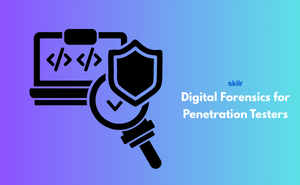👇 CELEBRATE CLOUD SECURITY DAY 👇
00
HOURS
00
MINUTES
00
SECONDS

The Digital Forensics for Penetration Testers certification blends two vital areas of cybersecurity: offensive testing and investigative analysis. Penetration testing identifies security gaps before attackers exploit them, while digital forensics digs into digital trails left behind by breaches to uncover facts and provide proof. By mastering both, professionals can both prevent attacks and respond effectively when they happen.
Put simply, it’s about wearing two hats: one as a hacker who thinks like attackers to test defenses, and the other as a detective who analyzes digital evidence after the fact. This dual expertise helps organizations strengthen security, respond quickly to threats, and maintain trust.
This exam is ideal for:
Domain 1 - Introduction to Digital Forensics
Domain 2 - Basics of Penetration Testing
Domain 3 - Forensic Investigation Process
Domain 4 - Forensic Tools and Techniques
Domain 5 - Integration with Penetration Testing
Domain 6 - Incident Response and Reporting
Industry-endorsed certificates to strengthen your career profile.
Start learning immediately with digital materials, no delays.
Practice until you’re fully confident, at no additional charge.
Study anytime, anywhere, on laptop, tablet, or smartphone.
Courses and practice exams developed by qualified professionals.
Support available round the clock whenever you need help.
Easy-to-follow content with practice exams and assessments.
Join a global community of professionals advancing their skills.
Staying updated in the rapidly evolving field of digital forensics and penetration testing requires continuous learning. Participating in online forums, attending industry conferences, enrolling in advanced training courses, and reading cybersecurity publications and blogs are excellent ways to remain informed. Additionally, experimenting with new tools and techniques in virtual labs or during penetration testing engagements helps maintain practical expertise.
Several industries require digital forensics expertise, particularly those that handle sensitive data or are frequent targets of cyberattacks. These industries include finance, healthcare, government, law enforcement, and retail. Digital forensics professionals are essential for ensuring regulatory compliance, investigating breaches, and safeguarding critical information within these sectors.
Common tools used in digital forensics for penetration testing include EnCase, FTK Imager, Autopsy, and Volatility for memory forensics. Additionally, penetration testers often use network forensic tools such as Wireshark and tcpdump to capture and analyze network traffic. For malware analysis, tools like Ghidra, IDA Pro, and OllyDbg are frequently employed. Mastery of these tools is essential for a successful career in both fields.
Digital forensics can uncover system vulnerabilities by analyzing digital evidence from compromised systems. By examining logs, registry data, network traffic, and file structures, forensic investigators can trace the steps of an attack, identify exploited vulnerabilities, and provide recommendations to fortify the system. For penetration testers, forensics helps identify weak points that can be exploited in future attacks.
Digital forensics plays a crucial role in incident response by providing the necessary tools and techniques to investigate and analyze cyberattacks. It helps incident response teams identify the root cause of security breaches, recover lost or deleted data, and gather evidence for legal action. Digital forensics also supports the identification of compromised systems and the mitigation of future vulnerabilities.
The market demand for digital forensics professionals is growing steadily, driven by the increasing frequency and complexity of cyberattacks. As organizations face a rising need to investigate data breaches, uncover cybercriminal activities, and ensure compliance with security regulations, the demand for skilled digital forensics experts continues to rise. This trend is expected to persist as more businesses prioritize robust cybersecurity infrastructures.
Digital forensics provides essential insights into the methods and techniques used by attackers during penetration testing. It helps penetration testers track malicious activities, recover deleted data, analyze network traffic, and identify vulnerabilities in systems. By integrating forensics into their work, penetration testers can provide more thorough security assessments and ensure comprehensive incident response and threat analysis.
Professionals with expertise in both digital forensics and penetration testing have a wide range of career opportunities, including roles such as cybersecurity consultant, penetration tester, digital forensics investigator, incident response specialist, and malware analyst. These skills are in high demand within various sectors, including government agencies, law enforcement, financial institutions, and large corporations, which require robust security measures to detect and respond to cyber threats.
Certifications such as Certified Ethical Hacker (CEH), GIAC Certified Forensic Analyst (GCFA), or Offensive Security Certified Professional (OSCP) validate your skills and knowledge, making you more competitive in the job market. These certifications demonstrate a commitment to professional growth and increase trust with potential employers who seek qualified experts to handle complex cybersecurity threats and investigations.
To excel in digital forensics for penetration testers, a strong foundation in penetration testing tools, techniques, and methodologies is essential. Familiarity with systems such as Kali Linux, CSI Linux, and Metasploit, along with expertise in digital forensics tools like Autopsy, EnCase, and FTK Imager, is critical. Additionally, understanding how to collect, preserve, and analyze evidence, along with knowledge of network forensics, malware analysis, and memory forensics, is highly beneficial.